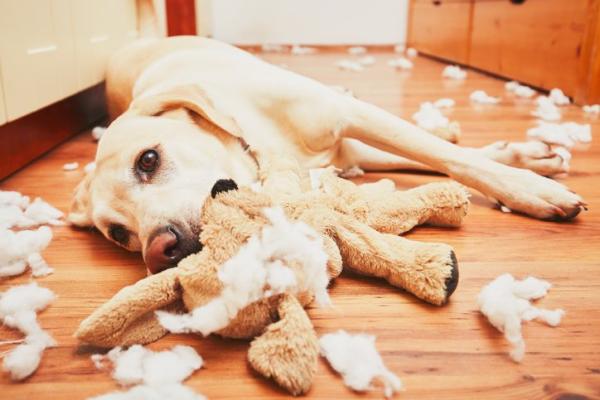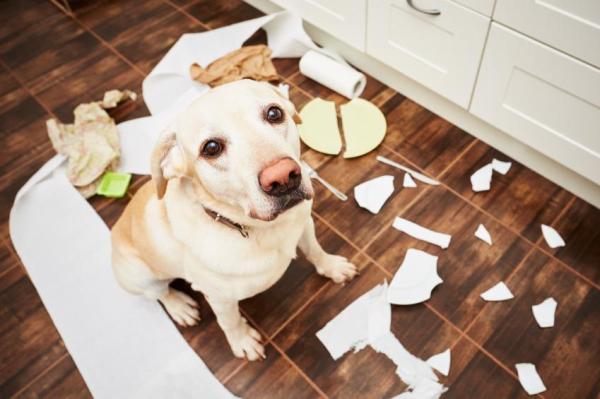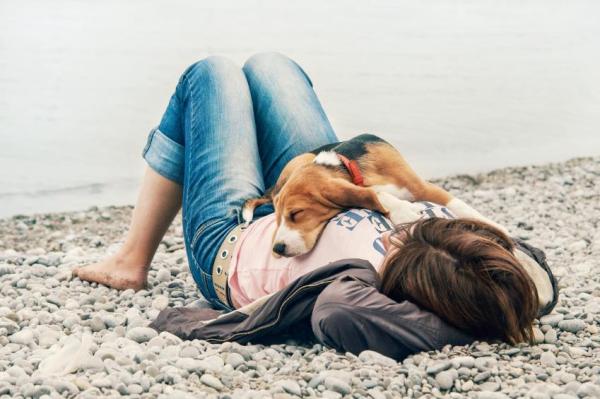
When a dog becomes destructive, there is an obvious problem for the household. Whether they destroy toys, sofa cushions or any other household item, the result can be stuffing or other parts of the object strewn across the home. Not only does this create a mess, but there is always the worry they will destroy something valuable of ours. However, when a dog is destructive, it is a sign there is a problem with the dog. Whether this is a practical problem, usually in terms of lacking sufficient education, or an emotional problem for the dog, it needs to be addressed.
At AnimalWised, we look at what happens when your dog destroys their toys and other objects. We explain why this is happening and provide some practical solutions to stop this behavior.
Why is my dog destroying toys?
The unfortunate root cause of why dogs destroy toys and other objects is that they are domesticated animals. This means they were once wild and enjoyed the freedom of being able to cater to their whims. This is something they cannot always do in the domestic environment. Fortunately, the process of domestication has led to human/canine coexistence which can be mutual beneficial.
For a peaceful and rewarding coexistence, there is a responsibility for the human guardian to meet some basic care needs. This refers to more than just feeding and housing the dog. We need to meet their emotional needs as much as the physical. We need to ensure they are walked regularly to exercise their body, but we also need to play with them and educate them to exercise their mind.
When a dog is not given enough stimulation, whether physical or cognitive, they are being neglected. When a dog is neglected, they will develop behavioral problems. These can take many forms, but destroying objects is just one of them. We take a look at the five main reasons in more detail below.
Personality
While our influence over a dog can lead to some behavioral issues, it is not the only factor in their behavior. Some dogs are simply more destructive than others. We cannot put this down simply to genetics, but some breeds have been developed for specific behaviors. Hunting is one of them and, even if your companion dog isn't engaged for hunting, they can still possess some of these traits.
One example are different Spaniel type dogs. These dogs have previously been used as hunting and ratting dogs. They were often sent down burrows to capture rodents and rabbits, grasping them by the neck for the kill. When dogs play with their toys, they are often exercising basic hunting instincts in the domestic environment. Especially if they toy resembles their natural prey, they may destroy them by enacting very natural behaviors.
Moreover, all dogs are individuals with individual personalities. Some may be a little more hyperactive than others and destroy toys as a way to release energy. This is in a large part due to their physiology, especially their hormonal balance.

Boredom
Dogs often destroy things when their owners are away. Since they have nothing else to do and need to shake off their boredom, many dogs find an activity to keep them entertained. We leave their toys around to give them environmental enrichment and activities to engage in. However, if this environmental enrichment is insufficient, they may act out by destroying the toys.
It is logical that any animal that is left alone for many hours each day becomes bored and looks for a way to overcome boredom. Although it occurs especially in dogs of breeds developed for hunting or work (protection dogs), the truth is that it is a state of mind that occurs frequently in all dog breeds.

Anxiety
Boredom can lead to anxiety, but there are many different reasons dogs can become anxious. One of the most common is separation anxiety. Dogs are social animals that need contact with other beings, even those animals do not form a pack. Chewing and digging are activities that help reduce the anxiety they feel when left alone. So too is destruction of toys.
When we leave for a significant amount of time, an anxious dog will not know when we are coming back. They may even fear we never come back. If this happens, they will become insecure, fearing they won't be fed, exercised or have the necessary company they need to feel safe. If we leave for long periods and notice that our dog destroys their toys, it is quite possible they are suffering from separation anxiety.
Anxiety can lead to many different compulsive behaviors, more than just destroying toys. They may lick metal, run in circles or perform a variety of strange acts.

Frustration
When a dog is locked in the house alone, they have no control over their environment. They can't get anything they want, can't investigate the strange noises they hear outside, can't open the doors to go play, etc. This inability to manipulate their environment creates much frustration in any animal. This frustration can be reduced or eliminated through certain activities that keep the animal active. Some are more fun than others, but this stimulation is necessary.
Have you ever seen a circus lion or tiger in those little cages where they are transported? Or maybe some big cat in an zoo locked in those small Victorian cages in which the animal has nothing to do? These animals often develop stereotypical behaviors, such as pacing back and forth over and over again. These behaviors serve to relax the animal and reduce frustration.
In this way, chewing things and destroying toys are behaviors that can become stereotypical for dogs that are left alone for many hours day after day. Chewing and biting have a relaxing effect on dogs that helps them pass the time. It is a similar reason to why we find bursting bubble wrap so enjoyable.
Poor education
Education and training for dogs are vital for peaceful coexistence. We need to teach the dog boundaries from a young age so they can know what is appropriate and what isn't. When dogs live with humans, they do so through learned behavior, not pure instinct. This is why learning canine body language is so important for us as it is not only the dog who needs to be educated.
Unfortunately, canine education is too often neglected or done poorly. Dogs want to be given rules and commands, it is something they have developed during the domestication process. If we don't give it too them, they will seek out other ways to express themselves, including through destroying toys.
Another problem is that we can too often reinforce the wrong behaviors. For example, if we let a dog sit on the couch when they are a puppy, they will internalize that this is something OK for them to do. If we try to stop them from doing so when they are an adult, we will confuse them and they won't understand why they are being prevented from doing so.
Dogs will often destroy things because their poor education confuses them. It is a way to release the pent up energy this generates. We need to be consistent and fair, using only positive reinforcement to help them understand what to do. Shouting and using negative reinforcement (especially physical pain) will only make them more destructive.

How to stop a dog from destroying their toys
The best way to treat and prevent destructive behavior in dogs is to teach them limits and boundaries. However, our approach will depend on what is the underlying cause of the issue. For example, if the dog is dealing with boredom or anxiety, we need to find ways to engage with them, even if we are not there. For example, a kong toy uses food to engage both body and mind and keep the dog more stimulated than other toys.
Check out this article to find out how kong toys work for dogs.
Likewise, as we have seen in the previous section, all our reactions to the different behaviors of our dog influence their own behavior. As funny as it may seem to you that your three-month-old Chihuahua is capable of carrying an object that weighs more than them, you must correct this behavior by removing the object in question. Use positive reinforcement and toys which are suitable for their size and temperament.
If your dog is destructive with their toys because they spend too much time alone, we need to find a way to keep them engaged. We can provide more environmental enrichment, play music while we are not there or have someone visit them when we can't. This can be a friend or even a professional dog walker. Also, when we are with the dog, we should ensure we don't encourage their anxiety by giving them too much attention or allowing them to do what we want. As we stated, boundaries are helpful to them.
Generally, your dog's destructive behavior is because their needs are not attended to properly. If you think you are providing the right level of care, but they still destroy their toys, you should speak to a canine ethologist or dog trainer to asses the situation. They can provide more practical guidelines specific to your dog and their needs.
If you want to read similar articles to My Dog Destroys Their Toys, we recommend you visit our Behavioral problems category.